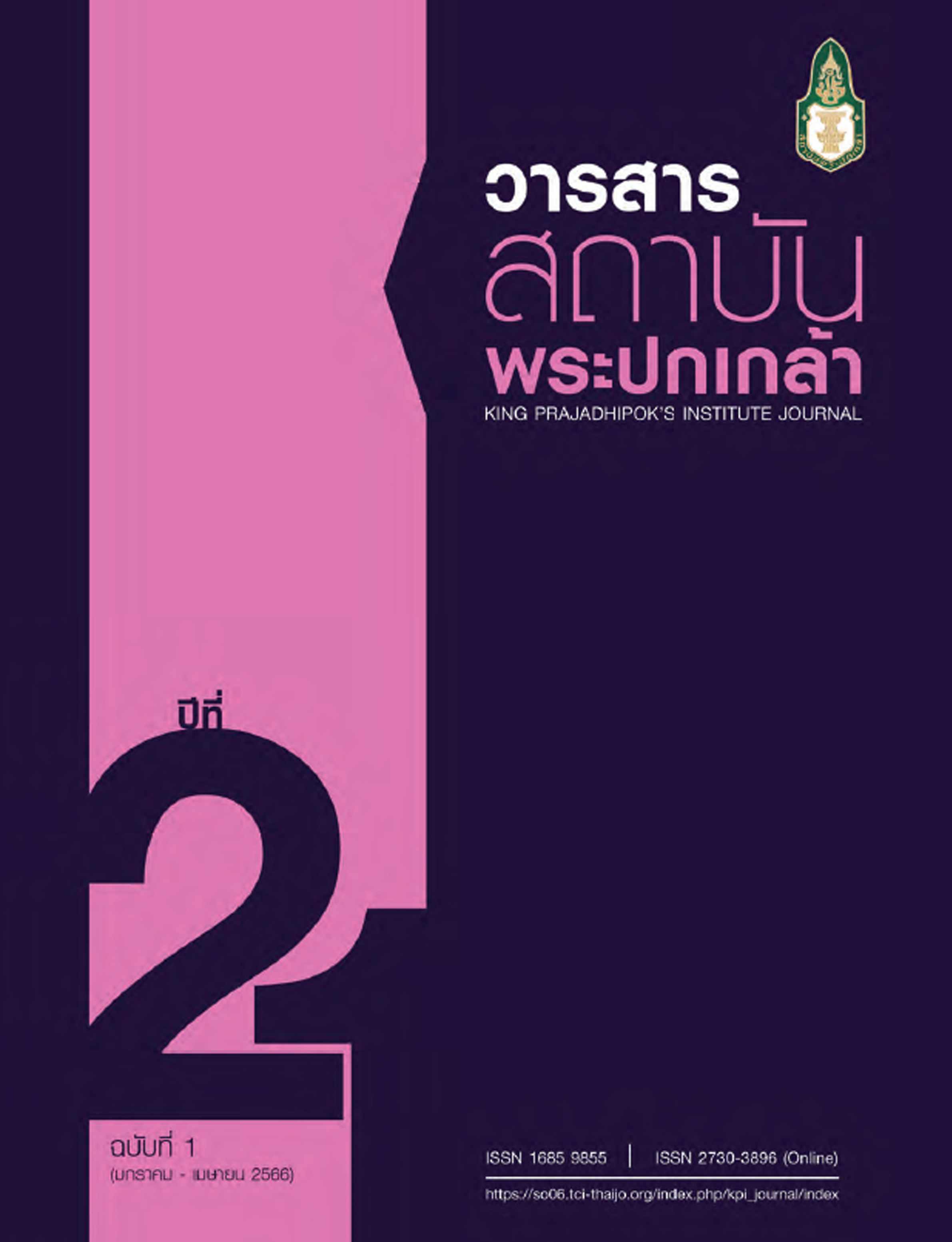The Study of Institutional and Political System Factors Affecting Changes in Educational Public Expenditure from 1998 to 2019
Main Article Content
Abstract
This research article analyzes the effects of institutional and political system factors, compared with socioeconomic factors, on the adjustment in public expenditure on education in Thailand, using secondary data and time series data for 22 years from 1998 to 2019. The objective of the study is to observe the influence of institutional and political system factors on the changes in public expenditure on education, compared with that of socioeconomic environment factors from 1998 to 2019, and to propose policy recommendations that improve the allocation of public expenditures more focused on education development to reduce inequality and expand educational opportunities.
The result of the study reveals that the influential socioeconomic factors on the change in public education expenditure, such as population, economic development (gross domestic product change rate), income inequality (Gini coefficient), and trade openness, are correlated with the public expenditure on education. On the other hand, institutional and political system factors inducing the changes in public education expenditure include gradual decision-making in bureaucracy—analyzing public education expenditures in the previous years, government efficiency, and political stability & absence of violence. The public education expenditure tends to gradually modify from the original due to changes in the demographic, gross domestic product change rate, and the Gini coefficient, which are socioeconomic factors that slowly shift and are difficult for the state to control. As a result, the allocation of public expenditure on education has altered slightly from the previous year. However, the country is a high level of inequality, so the significant shift in education expenditure requires changes in other factors. For instance, make use of the opportunities from trade openness to achieve economic growth that will be an indirect factor for the government in generating more revenue for expanding public services, along with supervision to ensure that government agencies operate efficiently so that the budget is used more effectively and efficiently, same as overseeing political stability and civil liberties for continuous development.
Article Details

This work is licensed under a Creative Commons Attribution-NonCommercial-NoDerivatives 4.0 International License.
@ 2020 King Prajadhipok's Institute The Government Complex Commemorating All Right Reserved.
References
ภาษาไทย
กองทุนเพื่อความเสมอภาคทางการศึกษา. (2561). เจาะลึกบัญชีรายจ่ายด้านการศึกษาไทย และข้อเสนอเชิงนโยบาย. สืบค้นจาก https://www.eef.or.th/wp-content/uploads/
/10/PB_EEF-1.pdf
เกริกเกียรติ พิพัฒน์เสรีธรรม. (2546). การคลังว่าด้วยการจัดสรรและการกระจาย. กรุงเทพฯ: มหาวิทยาลัยธรรมศาสตร์.
ชัยยุทธ ปัญญสวัสดิ์สุทธิ์. (2558). เผยรายจ่ายการศึกษาไทย: เงินหายไปไหนหมด. ใน โครงการติดตามประเด็นเศรษฐกิจไทย. กรุงเทพฯ: มหาวิทยาลัยธรรมศาสตร์.
ธร ปีติดล. (2559). ภาษีกับการแก้ปัญหาความเหลื่อมล้ำ. สืบค้นจาก https://www.bangkok
biznews.com/blogs/columnist/112691
พลภัทร บุราคม. (2560). รายจ่ายสาธารณะ: ประสิทธิภาพในการจัดสรรและประสบการณ์ระหว่างประเทศ. กรุงเทพฯ: คณะรัฐประศาสนศาสตร์ สถาบันบัณฑิตพัฒนบริหารศาสตร์.
. (2561). ปัจจัยที่มีอิทธิพลต่อการเปลี่ยนแปลงของรายจ่ายสาธารณะและการกระจายผลประโยชน์ของรายจ่ายสาธารณะในประเทศไทย. นนทบุรี: โรงพิมพ์รัตนไตร.
เพ็ญแข แสงแก้ว. (2544). การวิจัยทางสังคมศาสตร์. กรุงเทพฯ: คณะวิทยาศาสตร์และเทคโนโลยี มหาวิทยาลัยธรรมศาสตร์.
วรพงศ์ ตระการศิรินนท์. (2553). ปัจจัยที่มีผลต่อรายจ่ายสาธารณะด้านสังคมและผลต่อการกระจายรายได้ของไทย. (รัฐประศาสนศาสตรดุษฎีบัณฑิต) สถาบันบัณฑิตพัฒนบริหารศาสตร์, คณะรัฐประศาสนศาสตร์. กรุงเทพฯ.
สมชัย จิตสุชน. (2558). รายงานการวิจัย ความเหลื่อมล้ำในสังคมไทย: แนวโน้ม นโยบาย และแนวทางขับเคลื่อนนโยบาย. กรุงเทพฯ: สถาบันวิจัยเพื่อการพัฒนาประเทศไทย.
สมบัติ ธํารงธัญวงศ์. (2560). นโยบายสาธารณะ: แนวความคิด การวิเคราะห์ และกระบวนการ. กรุงเทพฯ: โครงการเอกสารและตำคณะรัฐประศาสนศาสตร์ สถาบันบัณฑิตพัฒนบริหารศาสตร์.
สำนักงานเศรษฐกิจการคลัง. (2566). เหตุการณ์สำคัญในประวัติศาสตร์เศรษฐกิจไทย. สืบค้นจาก http://www.fpojournal.com/important-events-in-thai-economic-history/
สุชาติ ประสิทธิ์รัฐสินธุ. (2545). การใช้สถิติในงานวิจัยอย่างถูกต้องและได้มาตรฐาน. กรุงเทพฯ: สามลดา.
ภาษาอังกฤษ
Buracom, P. (2017). Globalization, Democracy, and Social Spending in ASEAN. Proceedings of 2017 Annual KAPA International Conference, South Korea, 1759-1783.
Easton, D. (1957). An Approach to the Analysis of Political Systems. World Politics, 9(3), 383-400.
. (1965). A Framework for Political Analysis. Englewood Cliffs, N.J.:
Prentice-Hall.
Mauro, P. (1997). Why worry about corruption?. Washington, D.C.: International Monetary Fund.
Mueller, D. C. (1987). The Growth of Government: a Public Choice Perspective. Staff Papers-International Monetary Fund, 115-149.
Musgrave, R. A. (1969). Fiscal Systems. New Haven: Yale University Press.


